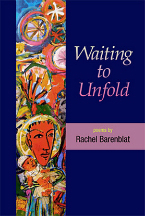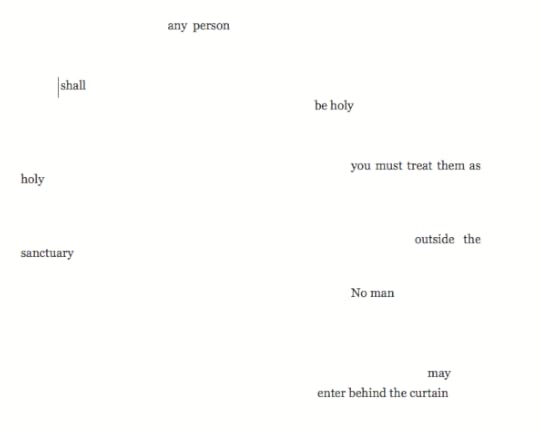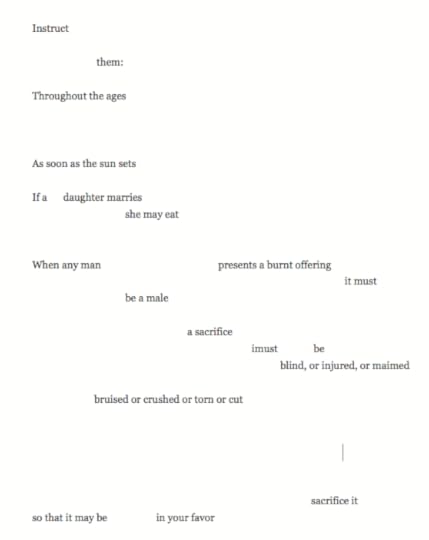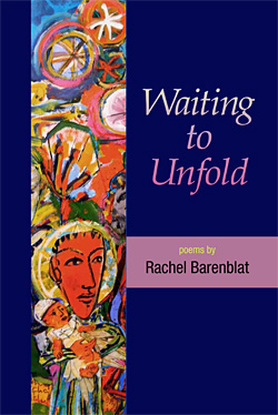Rachel Barenblat's Blog, page 191
April 28, 2013
Daily April poem: riffing off of a 30/30 prompt
THREE FISH
Left in the cup-holder
of the convertible carseat:
three goldfish crackers
waiting patiently
to follow their fellows
into oblivion.
This poem is riffing off of the "three new fish" prompt at 30/30 poetry. New fish made me think of old fish, which made me think of goldfish crackers, and this poem unfolded from there.
April 27, 2013
Daily April poem: a Biblical erasure poem
HOLY
Any person shall be holy.
You must treat them as holy
outside the sanctuary.
No man may
enter behind the curtain --
instruct them throughout the ages.
As soon as the sun sets
if a daughter marries
she may eat.
When any man
presents a burnt offering
it must be a male.
A sacrifice must be
blind, or injured, or maimed
bruised or crushed or torn or cut.
Sacrifice it
so that it may be
in your favor.
The folks at NaPoWriMo invited the writing of erasure poems. I've been reading daily erasure poems from Dave Bonta at Via Negativa for a while now (see The Pepys Erasure Project so far), so I was excited at the prospect of trying to create my own. Instead of working from an existing poem, I worked from part of last week's Torah portion, parashat Emor -- specifically from Leviticus chapters 21 and 22.
As a poet, I'm fascinated by the erasure process. As a rabbi, I do want to point out (in case it isn't clear) that this erasure process has substantially changed the text of Leviticus -- this is not what the Torah portion says! It's interesting to contemplate the version of scripture which would have argued that only women may enter into the Holy of Holies, or that in order to be fit for sacrifice an animal needed to be damaged rather than whole.
Below the cut: images of the erasure, so you can see how these words were carved out of the text.
April 26, 2013
Daily April poem: sidewalks (or lack thereof)
It's all downhill from here:
the winding driveway, the road
even the turn onto Silver
toward the cave and waterfall.
When cars careen past we walk
single file at the asphalt's edge.
Once we reach the beaver dam
the surface turns to hardpacked dirt,
gentler beneath our boots.
The chorus of frogs grows loud.
Look, a mallard duck sails
slow and regal across the pond.
A tiny plane soars, buzzing tinny,
across the blue expanse of sky.
This poem was written for the "sidewalks" prompt at 30x30. It was inspired, at least in part, by the experience of coming home after two days in New York City. Life in the Berkshires is a lot quieter, and there's a lot less pavement! Still, there are things happening here, and things to see and admire -- they're just...different.
April 25, 2013
New essay in Zeek about moving beyond binaries
I'm delighted to have an essay in Zeek once again. This essay owes a tremendous debt to Rabbi Irwin Kula and to the text study session in which he led my cohort of Rabbis Without Borders Fellows at our February gathering. The essay (like the text study session) looks at the Talmudic figure of Rabbi Meir as a paragon of post-triumphalism and a role model for striving to see through / beyond binary distinctions.
Here's a taste:
Talmud teaches (Eruvin 13b) that in the generation of Rabbi Meir there was none equal to him. He was the best mind of his generation, bar none. Why, then (the sages ask) was the halacha not fixed according to his insights? Because his insights were so deep that no one else could fathom them. “He would declare the ritually unclean to be clean and supply plausible proof, and the ritually clean to be unclean and supply plausible proof.”
The categories of tahor and tamei, clean and unclean (or, susceptible to ritual impurity, and not-susceptible to ritual impurity), were foundational to the sages of the Talmud. This was one of the primary binary distinctions through which they understood their world. And Rabbi Meir saw right through it.
A lot of progressive Jews are squeamish about the whole idea of tahor and tamei. (I’ve been there myself: what do you mean, the blood my healthy uterus generates every month makes me unclean?) Our discomfort with that system may get in the way of appreciating just how radical Rabbi Meir was.
But try this on for size: imagine looking at a staunch Republican and being able to see the Democratic values that person nonetheless holds. (And vice versa.) Imagine someone who could perceive the relativism beneath the most fundamentalist exterior — and the fundamentalism to which even the most relativist may be prone. In our modern paradigm, I think these are translations of what Rabbi Meir did and who he was in the world.
You can read the whole thing at Zeek: Being Meir.
Daily April poem: a triolet
NIGHTLIFE TRIOLET
Above the city, rabbis talk
laughing in a rooftop bar.
I lost my scarf, our crosstown walk --
above the city rabbis talk
of love and colleagues, get a lock
on each others' guiding stars.
Above the city, rabbis talk
laughing in a rooftop bar.
This triolet (written to a NaPoWriMo prompt) was inspired by a nightcap at the Gansevoort with a handful of my fellow Rabbis Without Borders. It's a bit flimsy -- there's not a lot of substance to it; I'm curious to see if I can write a triolet with a bit more gravitas -- but it was fun to write, and I figured y'all would enjoy a poem that's not about religious practice or my three-year-old for a change.
April 24, 2013
Truth from multiplicity: Rabbis Without Borders text study
For the building is constructed from various parts, and the truth of the light of the world will be built from various dimensions, from various approaches, for these and those are the words of the living God... It is the precisely the multiplicity of opinions which derive from variegated souls and backgrounds which enriches wisdom and brings about its enlargement. In the end all matters will be properly understood and it will be recognized that it was impossible for the structure of peace to be built without those trends which appeared to be in conflict. -- Rav Kook, Olat Raya, Vol. 1, p. 330
This quote appears at the top of a study sheet called Religion and Politics: Some Orienting Texts, which we worked with on the second day of our third Rabbis Without Borders fellows meeting. We began with the simple question: what is Rav Kook talking about here? What is "the building"?
We brainstormed some answers. It could be the third Temple, yet to be built; it could be Olam ha-Ba, the World to Come; it could be our own community; it could be the world at large. Rabbi Brad Hirschfield noted that Rav Kook can be read as focusing on the body politic of the Jewish people / the classical notion of the ingathering of the exiles, and also on individual human experience, and also on universal human experience -- all at once. (He also noted that we need to read Rav Kook's words both as theology and as poetry, which is, as y'all know, one of my favorite points of intersection.)
Rav Kook moves from "the building" to "the truth of the light of the world." It's arguable that he's talking here about truth itself. He could mean truth inside a single person; truth inside a people or community; truth inside all people -- and in all of these understandings, he's saying that truth will be built "from various dimensions and approaches." Truth is multivariant. Truth is in the future tense. It will be built, which means it isn't built yet. For Rav Kook, absolute truth does exist -- but it's emergent. It's not present, not fully -- and any claims about it must bear in mind that truth is a work in progress.
Imagine, said Rabbi Hirschfield, that at moments of our greatest political passion we understood simultaneously that there is real truth -- and, that truth is a work in progress. There may be an inclination to say "There's a truth but we're not there yet" -- but the idea of "we're not there yet" means there's a fixed "there" which we know we're heading toward. And for Rav Kook, by definition, when we get there, wherever there is, it will be different from whatever we can possibly imagine now. This took on a lot of resonance in the context of our two-day conversations about religion and politics. How might my relationship to politics change if I approached politics via the lens Rav Kook offers here? Brad continued:
Imagine that you're at a bus stop and it's starting to rain. So you get on a bus, not certain that it's going where you want to go... If you board the bus with questions for the driver, and interest in your fellow riders, and a keen interest in what's going on outside the windows, you'll be taking a very different ride from the other guy on the bus who thinks he knows exactly where he's going.
(This sparked several tweets which connected this bus metaphor with Robert Frost's The Road Not Taken.)
What I find so beautiful about this Rav Kook passage is the idea that truth is always emergent, always becoming, and always being-built out of multiple approaches and ideas and souls. In order for truth to be built, we need all of our "variegated souls and backgrounds."
Rav Kook is clear that "the building" requires all of us. And in the end, peace cannot be built (between any "us and them," whoever that is for you) without the existence of difference and conflict; otherwise there's nothing to bridge between. Peace can't be built without all of us, without the multiplicity of opinions, without the "variegated souls and backgrounds which enrich wisdom and bring about its enlargement." And ultimately, even the existence of difference and conflict -- for Rav Kook -- is only an "appearance." On a broader or deeper level we're part of something much bigger in which our differences are contained.
From this text, we went on to a text from Exodus Rabbah in which some sectarians challenge R' Simlai, "Are there not many deities in the world?" After all, they point out, the word Elohim -- one of our names for God -- is clearly a plural word, so that must imply that there are plural gods! R' Simlai offers a grammatical answer: the Torah text may use a plural-sounding word for God, but the verb which goes with it is singular, so obviously God is One. His disciples are dissatisfied with this. So another rabbi, R' Levi, offers the teaching that the voice of God was heard by each individual according to their own capabilities. At the moment of revelation, each person heard what they were able to hear. (In Reb Zalman's frequent framing: God broadcasts on all channels, and each of us receives on the channel to which we are attuned.)
The point is: for the Rabbis, the claim of a singular God is not disproven, but is in fact proved, by the multiplicity of revelation -- and the multiplicity of revelations are geared toward the capabilities of those who receive. If we believe in a singular God, then the more manifestations of God there are in the world, then the closer we come to the truth of the claim of the existence of that infinite One.
Or, as Rav Kook has it, "the building" of ultimate truth can only be built through our variegated souls and backgrounds. It is not despite but through our most passionate political and spiritual differences that truth can be built. (It is not despite but through the multiplicity of revelations that Oneness can be accessed.) It is in and through our differences that we access the One.
Daily April poem: inspired by a Yiddish folksong
COMING SOON
Ribbons and pearls adorn
this golden land, and messiah
will come this very year.
If we can only believe.
The man who taught me this
wept every time he sang
his body shaking with yearning
for the world redeemed
where no oil fires burn
and no mothers grieve
where no one would pour water
down another man's nostrils, or
pack a handmade bomb into a square
where joyous throngs have gathered.
I don't know anymore
what would bring her, what
he's waiting for, but
tradition says moshiach sits
with the lepers outside the gates
with the sick and poor and frightened
waiting for us to offer
a drink of fresh water
a clean bandage
an embrace.
This poem was inspired by the Yiddish folksong "Shnirele Perele." You can watch/listen to it on YouTube, read a bit about its history, and read the lyrics here at Perry Greenbaum's blog if you're so inclined. I love this song, though the melody (and meaning) wrenches at my heart.
The last few stanzas refer to the Talmudic story about the messiah sitting outside the gates.
April 23, 2013
Announcing Waiting to Unfold, new from Phoenicia!
I could not be more delighted to announce this news:
Waiting to Unfold has been published by Phoenicia Publishing, and its launch date is today!
it costs a mere $13.95 (US, CAN) / £9.10 / €10.66 and is available at Phoenicia Publishing and on Amazon (and Amazon UK and Amazon Europe) -- though twice as much goes to publisher and author if you buy it directly from Phoenicia.
Waiting to Unfold offers an unflinching and honest look at the challenges and blessings of early parenthood.
Poet
and rabbi Rachel Barenblat wrote one poem during each week of her
son's first year of life, chronicling the wonder and the delight along
with the pain of learning to nurse, the exhaustion of sleep
deprivation, and the dark descent into -- and eventual ascent out of --
postpartum depression.
Barenblat brings her rabbinic training
and deep spirituality to bear on this quintessential human experience.
She also resists sentimentality or rosy soft-focus. While some of these
are poems of wonder, others were written in the trenches.
These
poems resist and refute the notion that anyone who doesn't savor every
instant of exalted motherhood deserves stigma and shame. And they
uncover the sweetness folded in with the bitter.
By turns
serious and funny, aching and transcendent, these poems take an
unflinching look at one woman's experience of becoming a mother.
These rich poems will carry you into the great timeless miracle and
mystery of unfolding littleness, nonstop maternal alertness, beauty and
exhaustion and amazing, exquisite tenderness, oh yes. -- Naomi Shihab Nye, author of Fuel and The Words Under the Words
The intense observation of the poet and the intense observation of the
mother unite in a celebration of what is new and newborn, what is
intensely felt and cherished and what is lost and mourned. Rachel
Barenblat's poems are easy to enter into, and they carry both the
uniqueness of her persona as poet and serious Jew and the universality
of love that has made us all. There's a subversive wit here too, -- a
changing table that's also a throne of glory, or the baby chewing on his
mother's tefillin -- that speaks to a newly emerging sensibility about
what is reverent and what is holy. It's in the everyday as our best
American poets have taught us, and as Rachel Barenblat teaches us in a
new way too. -- Rodger Kamenetz, author of The Jew in the Lotus and the lowercase jew
In these remarkable poems Rachel Barenblat traverses the world of
first-time parenthood with insight, generosity, rare courage. She
shares first innocent awe, then unexpected darkness as a winter of the
soul claims squatter's rights in the nursery, and finally, aching,
yearning, growing toward hope, a relearning of holy presence in small
things. We ascend and plummet on the rollercoaster with her, terror in
the pit of the stomach, knuckles white, and then -- unparalleled joy.
"Daily I expand how much I can love/ your toes, your cough, your raised
eyebrow... Each day your glee polishes my rough edges/ and I shine[.]"
New parents will be astonished that someone has found words for their
deepest secrets, parents long past these early months will gratefully
nod -- yes, I remember, this is true. -- Merle Feld, author of A Spiritual Life: Exploring the Heart and Jewish Tradition and Finding Words
The book was designed by publisher Beth Adams; the cover art is a detail from "Creation," a mixed-media collage by the wonderful Mary Bullington.
Every book's launch feels a bit like a birth, but this one perhaps more than most. I'll have more to say later about the book and how it came into being, but for now, please join me in popping the cork on some virtual champagne.
And I hope you'll buy a copy for yourself -- for your mom (Mother's Day is coming soon in a lot of countries, including mine) -- for every pregnant woman you know -- for every parent you know, whether their kids are babies or senior citizens -- for anyone you know who has struggled with depression -- for anyone you know who loves poetry -- and for anyone you know who's interested in the implausible and amazing transformations entailed in a baby's first year of life, and a woman's first year of becoming something new.
(Phoenicia also published 70 faces in 2011. And they've published many other fantastic books of poetry, many of which I've reviewed here over the years. Support independent publishing! Buy copies for your friends!)
April 22, 2013
Waiting to Unfold events in the Berkshires this June
Readers of the North Adams Transcript know that I have a new book out and that readings are planned around the county next month -- thanks, Transcript, for Congregation Beth Israel Rabbi Rachel Barenblat Publishes Second Book of Poetry!
I'll be sharing poems from Waiting to Unfold across the Berkshires this June. I've got one reading in Pittsfield (central county); once in North Adams (north county); and once in Great Barrington (south county.)

Monday June 3, 12pm
Poetry reading and conversation / signing / Q-and-A / plus kosher lunch!
at the Older Adult Kosher Hot Meal Program sponsored by Jewish Federation of the Berkshires
Knesset Israel, 16 Colt Road, Pittsfield
Join Rabbi Rachel Barenblat, author of the newly-published Waiting to Unfold (Phoenicia, spring 2013), for a poetry reading and conversation. Rabbi Barenblat will read from Waiting to Unfold,
which collects poems written during her son's first year of life, and
will then participate in a conversation / Q-and-A about the poems and
what they contain.
Please RSVP to Knesset Israel so there are enough kosher hot meals for everyone. (All are welcome for the reading / conversation, whether or not you want to enjoy the kosher hot lunch, but if you do want a meal, let them know.)
Sunday June 9, 4pm
Poetry reading and conversation / signing / Q-and-A / plus refreshments!
Congregation Beth Israel, 53 Lois Street, North Adams
cosponsored by MotherWoman and the Berkshire County Perinatal Support Coalition
Join Rabbi Rachel Barenblat (70 faces,
Phoenicia, 2011) for a reading from Waiting to Unfold (Phoenicia, 2013),
her new collection of poems, written as weekly poems during her first
year of motherhood. Rodger Kamenetz says, "The intense observation of
the poet and the intense observation of the mother unite in a
celebration of what is new and newborn, what is intensely felt and
cherished and what is lost and mourned." Refreshments & book-signing
to follow.
CBI is my shul, and I'm honored to be sharing my poems from the bimah there. If you haven't yet visited our beautiful sanctuary set like a gem beside wetland and mountains, and coming to services doesn't tempt you, come listen to some poems instead!
Sunday June 23, 6pm
Poetry reading and conversation / signing / Q-and-A
The Book Loft, 332 Stockbridge Road, Great Barrington
sponsored by MotherWoman and the Berkshire County Perinatal Support Coalition
Poet Rachel Barenblat (70 faces, Phoenicia 2011 and Waiting to Unfold, Phoenicia 2013) will read from her new collection written during the first year of parenthood, with booksigning and conversation / Q-and-A (on subjects ranging from poetry and spirituality to postpartum depression and parenting) to follow.
Local/regional readers, I hope you'll join me for one or more of these events. Questions / comments welcome...
Daily April poem: lifecycle event
The family huddles close together.
The mountain beams, now devoid of snow.
The tasseled fringes of prayer shawls flutter.
The photographer calls encouragement --
turn toward him, that's right; adjust
the lapel, good, now smile, look at me
-- and all I can imagine is our own son
awkward and gangly at thirteen, draped
in a loose and flowing brand-new tallit
the opposite of the swaddling blankets
we pulled tight around his flailing limbs
just now before I blinked my teary eyes.
I wrote this poem on a Shabbat afternoon after presiding over the bar mitzvah of a young man in my congregation. I've been part of many b'nei mitzvah ceremonies before, but this was the first bar mitzvah I've done since our son was born, and the realization that someday it'll be our kid up there was poignant for me.
Rachel Barenblat's Blog
- Rachel Barenblat's profile
- 6 followers










